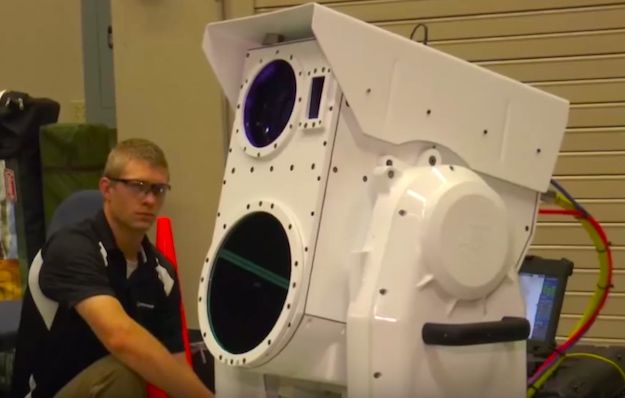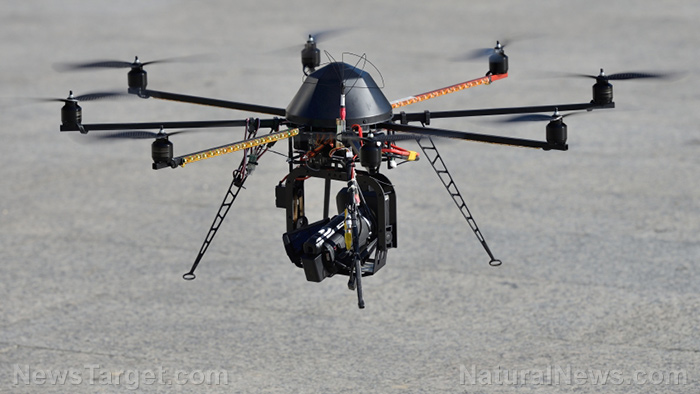Lasers could be the military’s most effective weapon against drones
10/18/2024 / By Kevin Hughes

The United States Army has managed to bring down hostile drones in the Middle East using lasers. While the move is seen by many as closer to science fiction than reality, many countries are now utilizing laser technology for military use.
The role of lasers will probably be limited due to their huge energy needs, restricted range and problems with bad weather, but militaries believe that the latest laser weapons could prove to be powerful tools for shooting down drones. These tools are now essential for modern combat, as militaries search for low-cost ways to counter the rapid spread of unmanned aerial vehicles (UAVs) in battlefields.
Laser weapons fire highly concentrated beams of light that release intense heat to their target. The beams, which travel at the speed of light, penetrate metal to destroy engines, fuel tanks, electronics and other critical parts of a target. Lower-intensity beams can be used to blind a drone’s sensors and cameras.
“The old adage that lasers were five years from being amazing and always will be, that is changing. Lasers for counter-drone [warfare] may have met their moment,” said Doug Bush, the U.S. Army’s assistant secretary for acquisitions, logistics and technology.
According to Bush, the U.S. has successfully deployed lasers at diverse places in the Middle East to shoot down UAVs.
As drone technology improves, so does anti-drone tech
Military lasers have made progress in the past few years because of technological advances and an increasing demand to seek more cost-efficient weapons amid the growing threat from drones.
The U.S. and its allies usually shoot down cheap drones with missiles that can cost hundreds of thousands of dollars apiece. Lasers, by comparison, are relatively inexpensive to build and operate, with energy being the biggest cost. So long as there is a power supply, these military lasers won’t run out of ammunition.
For instance, the government of the United Kingdom said the cost of operating its new DragonFire laser directed-energy weapon is less than $13 a shot. The deployment of weapons like DragonFire could save militaries around the world tens of millions of dollars over the cost of missiles launched to intercept drones.
The U.K. introduced the weapon to great fanfare earlier this year, praising its ability to hit a target the size of a coin from a kilometer away. A U.K. Defense Ministry statement said the laser beam can cut through metal “leading to structural failure or more impactful results if the warhead is targeted.”
Militaries have long been searching for options to counter drones, including high-power microwave devices that can interrupt or even fry the electronics of aerial threats. They have been experimenting with laser weapons for decades.
In the late 1990s, the U.S. Air Force partnered with Boeing to install a 12,000-pound laser weapon into a 747 aircraft. This experimental weapon, known as the Airborne Laser, was designed to shoot down planes and missiles from hundreds of miles away. (Related: US Naval Research Lab begins first laser energy test in space.)
This experimental weapon encountered many problems, including the large amount of energy required to generate a powerful beam over long distances. Over a decade of research, the Airborne Laser project cost taxpayers some $6 billion before being canceled by the Pentagon.
But laser technology has improved since, making it more practical to use for military forces.
Follow MilitaryTechnology.news for more news about military technology advancements.
Watch the video below about the U.K. Defense Ministry’s DragonFire laser-directed energy weapon system.
This video is from the Children Are NOT Sex Toys! channel on Brighteon.com.
More related stories:
Chinese military says it just achieved “huge breakthrough” in laser weapon technology.
Air Force looking at directed energy technologies to protect US from enemy missiles.
Military-industrial complex unveils laser-equipped Strykers for futuristic combat.
Sources include:
Submit a correction >>
Tagged Under:
anti-drone technology, big government, chaos, drones, future science, future tech, inventions, lasers, military lasers, military technology, national defense, national security, U.S. Army, UAVs, unmanned aerial vehicle, warfare, weapons technology, WWIII
This article may contain statements that reflect the opinion of the author
RECENT NEWS & ARTICLES
COPYRIGHT © 2017 INVENTIONS NEWS



















